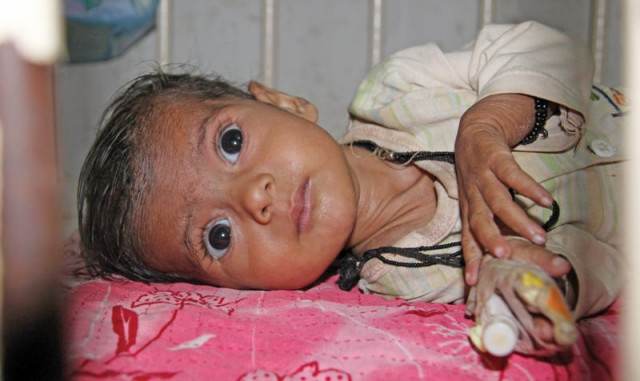Death by drought: Judges believe situation in Thar has deteriorated further
Federal, provincial governments given a week to explain what measures they took

Death by drought: Judges believe situation in Thar has deteriorated further
As the authorities continue to blame mother nature for the drought and rising death toll in Thar, judges have found that the situation has deteriorated further.
On Wednesday, they ordered the federal and Sindh governments to submit 'detailed and comprehensive' replies on their efforts to mitigate the situation. Both governments have a week to explain their performance in 'black and white' after which the Sindh High Court will pass 'appropriate orders.'
These directives were issued by a division bench, headed by SHC chief justice Maqbool Baqar, during a hearing of three identical petitions seeking directives for the authorities to control the situation and punish those responsible for it.
During Wednesday's proceedings, the petitioners' lawyer Faisal Siddiqui rebutted the claims made by the Sindh chief minister and his cabinet about their efforts to provide relief to the hundreds of families affected by the drought in Thar. Siddiqui referred to reports submitted by the district and sessions judge of Umerkot and a senior civil judge from Mithi as well as the chief secretary and health secretary of Sindh. He also read out portions of the two secretaries' reports on the relief provision to the drought-affected families along with the judicial officers' reports based on inspection.
Justice Baqar noted that reports submitted by judicial officers along with those submitted by the chief and health secretaries revealed that the situation in Thar had deteriorated further. "We direct the chief secretary and the Sindh government to file a detailed report comprising each issue, disclosing in detail what efforts have been made to deal with such issues and what has been planned for the future," said the two-judge bench.
The bench also ordered the federal government to file a similar detailed report, particularly on what efforts they had made to avert and mitigate the situation. The two judges gave the federal and provincial governments a week's time to submit their reports and comments.
Case history
Last year, three petitions were filed by the Sindh High Court Bar Association, the Pakistan Institute of Labour, Education and Research and others, who had sought action against government functionaries for their failure in providing health and relief facilities to the drought-affected people of Tharparkar.
Inquiry, inspection and rejection
During the proceedings which have been going on for months, the judges had ordered that a commission be formed to investigate the causes of the deaths and failure of the authorities to take preventive measures.
Earlier, this week the Sindh government had approached the Supreme Court, which has already initiated suo motu proceedings, with a complaint that the issue was being overplayed in the media and that the SHC had formed an inquiry commission unnecessarily.
Published in The Express Tribune, November 27th, 2014.



















COMMENTS
Comments are moderated and generally will be posted if they are on-topic and not abusive.
For more information, please see our Comments FAQ